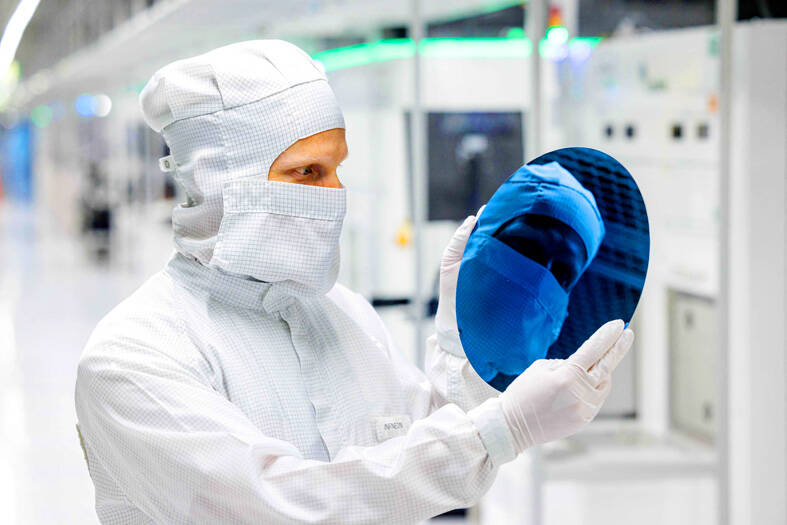Global semiconductor sales are forecast to decrease 11.2 percent this year from a year earlier due to weak market demand for electronic goods and higher chip inventories, US research firm Gartner Inc said in a report on Wednesday last week.
Total sales are estimated at US$532.2 billion this year, down from US$599.6 billion last year, when sales grew marginally by 0.2 percent from 2021, Gartner said.
“As economic headwinds persist, weak end-market electronics demand is spreading from consumers to businesses, creating an uncertain investment environment. In addition, an oversupply of chips, which is elevating inventories and reducing chip prices, is accelerating the decline of the semiconductor market this year,” Gartner practice vice president Richard Gordon wrote in a statement.

Photo: AFP
Semiconductors have become more important across all industries, given higher use not just in smartphones and computers, but in data centers, vehicles, home appliances and industrial automation facilities.
However, the semiconductor industry is facing a number of challenges in the next decade, including stagnating PC, tablet and smartphone markets, along with rising geopolitical tensions and deglobalization, Gordon said.
While the combined PC, tablet and smartphone markets account for an estimated 31 percent of semiconductor sales this year, totaling US$167.6 billion, “the past decades of high volume, high-dollar content market drivers are coming to an end” in those markets, “where technology innovation is lacking,” he said.
Additionally, COVID-19 and US-China trade tensions have accelerated deglobalization trends and the rise of “techno-nationalism,” Gordon said.
“Semiconductors today are seen as a national security issue,” he said. “Governments around the world are scrambling to build self-sufficiency in the semiconductor and electronics supply chain. This is leading the incentivization of onshoring initiatives across the world.”
The US Creating Helpful Incentives to Produce Semiconductors (CHIPS) and Science Act, which was passed in August last year, aims to increase the amount of domestically made semiconductors, while complementary efforts in Europe, South Korea and Taiwan to boost chip production at home are poised to reshape the global semiconductor industry, analysts have said.
The Gartner report said the automotive, industrial, military and civil aerospace semiconductor markets would continue to achieve growth this year, with sales in the automotive chip market alone likely to increase 13.8 percent year-on-year to US$76.9 billion.
However, memory chips could continue to underperform this year, with DRAM and NAND markets facing weak end-market demand and high inventory levels, the report said.
Memorychip sales are forecast to drop 35.5 percent to US$92.3 billion this year before rebounding next year with a 70 percent increase, it said.
Gartner said it expects many more end markets for semiconductors to emerge, although small and fragmented, with sales growth mainly from the automotive, industrial and the Internet of Things sectors, as well as military and aerospace fields, it added.
“End-market demand will be less exposed to consumer discretionary spending and more exposed to business capital spending. Supply chains will be more complex with many more intermediaries involved and varied channels to market, and to satisfy different end-market requirements, different types of capacity will be required,” Gordon wrote.

BIG BUCKS: Chairman Wei is expected to receive NT$34.12 million on a proposed NT$5 cash dividend plan, while the National Development Fund would get NT$8.27 billion Taiwan Semiconductor Manufacturing Co (TSMC, 台積電), the world’s largest contract chipmaker, yesterday announced that its board of directors approved US$15.25 billion in capital appropriations for long-term expansion to meet growing demand. The funds are to be used for installing advanced technology and packaging capacity, expanding mature and specialty technology, and constructing fabs with facility systems, TSMC said in a statement. The board also approved a proposal to distribute a NT$5 cash dividend per share, based on first-quarter earnings per share of NT$13.94, it said. That surpasses the NT$4.50 dividend for the fourth quarter of last year. TSMC has said that while it is eager

‘IMMENSE SWAY’: The top 50 companies, based on market cap, shape everything from technology to consumer trends, advisory firm Visual Capitalist said Taiwan Semiconductor Manufacturing Co (TSMC, 台積電) was ranked the 10th-most valuable company globally this year, market information advisory firm Visual Capitalist said. TSMC sat on a market cap of about US$915 billion as of Monday last week, making it the 10th-most valuable company in the world and No. 1 in Asia, the publisher said in its “50 Most Valuable Companies in the World” list. Visual Capitalist described TSMC as the world’s largest dedicated semiconductor foundry operator that rolls out chips for major tech names such as US consumer electronics brand Apple Inc, and artificial intelligence (AI) chip designers Nvidia Corp and Advanced

Saudi Arabian Oil Co (Aramco), the Saudi state-owned oil giant, yesterday posted first-quarter profits of US$26 billion, down 4.6 percent from the prior year as falling global oil prices undermine the kingdom’s multitrillion-dollar development plans. Aramco had revenues of US$108.1 billion over the quarter, the company reported in a filing on Riyadh’s Tadawul stock exchange. The company saw US$107.2 billion in revenues and profits of US$27.2 billion for the same period last year. Saudi Arabia has promised to invest US$600 billion in the US over the course of US President Donald Trump’s second term. Trump, who is set to touch

SKEPTICAL: An economist said it is possible US and Chinese officials would walk away from the meeting saying talks were productive, without reducing tariffs at all US President Donald Trump hailed a “total reset” in US-China trade relations, ahead of a second day of talks yesterday between top officials from Washington and Beijing aimed at de-escalating trade tensions sparked by his aggressive tariff rollout. In a Truth Social post early yesterday, Trump praised the “very good” discussions and deemed them “a total reset negotiated in a friendly, but constructive, manner.” The second day of closed-door meetings between US Secretary of the Treasury Scott Bessent, US Trade Representative Jamieson Greer and Chinese Vice Premier He Lifeng (何立峰) were due to restart yesterday morning, said a person familiar